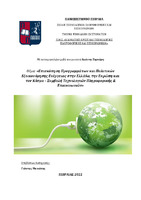Επισκόπηση προγραμμάτων και πολιτικών εξοικονόμησης ενέργειας στην Ελλάδα, την Ευρώπη και τον κόσμο – Συμβολή τεχνολογιών πληροφορικής & επικοινωνιών

Προβολή/
Λέξεις κλειδιά
Εξοικονόμηση ενέργειας ; Κατανάλωση ενέργειας ; Ενεργειακή φτώχεια ; Τεχνολογίες Πληροφορικής και Επικοινωνιών ; Προγράμματα εξοικονόμησης ενέργειας ; Πολιτικές εξοικονόμησης ενέργειαςΠερίληψη
Το φαινόμενο της Κλιματικής Κρίσης βλέπουμε πως προκαλεί ολοένα και εντονότερες συνέπειες σε όλες τις άκρες του πλανήτη. Η ανάγκη για περιορισμό των εκπομπών αερίων του θερμοκηπίου που προκαλούν το φαινόμενο είναι πια αδήριτη. Η μεγάλη δυσκολία του εγχειρήματος αυτού έγκειται στο γεγονός ότι η οικονομική δραστηριότητα σε όλα τα μήκη και πλάτη της Γης απαιτεί τεράστιες ποσότητες ενέργειας, η οποία όταν προέρχεται από ορυκτά καύσιμα οδηγεί σε τεράστιας κλίμακας εκπομπές αερίων του θερμοκηπίου.
Πέρα από τη στροφή σε ανανεώσιμες πηγές ενέργειας, είναι αναγκαία η στροφή και η επένδυση στην έννοια της εξοικονόμησης ενέργειας καθώς και στην αποδοτικότερη χρήση αυτής. Αρκετές είναι οι πρωτοβουλίες που έχουν ληφθεί τις τελευταίες δεκαετίες από διεθνείς οργανισμούς αλλά και μεμονωμένα κράτη, όπου εφαρμόζονται πολιτικές και προγράμματα εξοικονόμησης ενέργειας τα οποία ταιριάζουν καλύτερα σε κάθε περίπτωση κρατών στα οποία επικρατούν διαφορετικές κλιματολογικές, οικονομικές και κοινωνικές συνθήκες.
Στα πλαίσια της παρούσας εργασίας, γίνεται μια επισκόπηση στα προγράμματα και τις πολιτικές εξοικονόμησης ενέργειας που έχει εφαρμόσει η Ελλάδα, κάνοντας μια αντιπαραβολή τόσο με χώρες της Ευρωπαϊκής Ένωσης οι οποίες προσπαθούν και αυτές να δράσουν μέσα στα πλαίσια των Κοινοτικών πλαισίων που έχουν συναποφασιστεί, όσο και με χώρες με πρωταγωνιστικό ρόλο στο παγκόσμιο στερέωμα όπως οι ΗΠΑ, το Ηνωμένο Βασίλειο και η Κίνα.
Σε δεύτερο επίπεδο, εξετάζεται το πώς η αλματώδης πρόοδος των νέων τεχνολογιών πληροφορικής και επικοινωνιών μπορεί να συμβάλλει στην εξοικονόμηση ενέργειας, προς όφελος μάλιστα των οικονομικά ασθενέστερων πολιτών, ενώ παρουσιάζεται και μια καταγραφή ορισμένων καλών πρακτικών εφαρμογής των τεχνολογιών αυτών.


